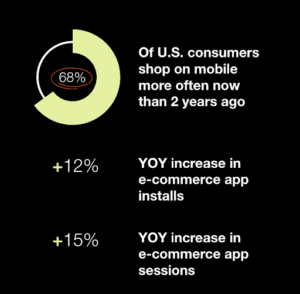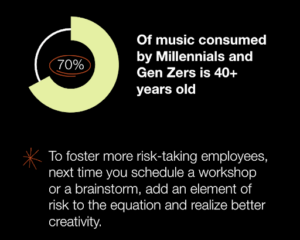September 28, 2022 / Thought Leadership
Q3 Emerging Trends Report
 CP’s team of senior strategists and anthropologists regularly release insights on cultural, economic, and social shifts that can impact our clients. Here are their most recent observations.
CP’s team of senior strategists and anthropologists regularly release insights on cultural, economic, and social shifts that can impact our clients. Here are their most recent observations.
1. “I bought it on TikTok!” Ecommerce knows no digital boundaries.
Ecommerce app installs, sessions and now purchases are all way up year-over-year (particularly in recent months), including on historically social-focused platforms like TikTok and Instagram. These novel purchases are up so much that experts are exploring new opportunities for native content and stress a heightened need to focus on conversion metrics.
Brands need to evaluate their presence across all digital channels and begin to strategize how and where to expand product offerings and sales opportunities across organic content.
Sources: Forbes, Adjust, Digital Commerce

2. Where have societies’ dependable “rocks” gone?
In the past four weeks alone we’ve seen Walmart, our largest, trusted retail institution announce major layoffs as they anticipate a weakening economy and see profits shrinking due to double-digit inflation. This has fueled consumer outrage on social channels. We’ve also seen an FBI raid of former President Trump’s home to seize classified materials taken when leaving office. News narratives have furthered Americans’ doubt of U.S. institutions creating a heightened sense of instability that we predict will grow into a full-fledged mainstream trend in the next few quarters.
The opportunity for brands is to be more communicative and intentional in curating messages of reassurance – both to internal and external audiences. Messages that reinforce good policies or practices, for example, create a sense of consistency and moral stability that consumers crave.
Sources: Gallup
3. “Limited edition” digital content is all the rage!
Time-sensitive/recency forms of media—i.e. that content which is available for a limited period of time/never to be seen again—is an increasingly common feature, especially when it comes to social media.
Part of what’s appealing about time-sensitive content is that if you’re looking at it, it’s guaranteed to be current and relevant. That inaccessibility – which is the antithesis of the internet’s main characteristic, creates an exclusivity and specialness to the content. It can also feel authentic and proprietary, which is why WhatsApp has recently been working on a feature to block screenshots of media you’re only meant to view once – adding to its exclusivity and once-in-a-lifetime exposure.
Sources: Social Media Today, Axios, Hubspot, Better Marketing, Android Police
4. Poetry has entered its own Renaissance – say “hello” to Instapoetry.
Poet Rupi Kaur’s recent world tour is being met with great fanfare, an extension of the growing popularity of poetry’s newest incarnation, Instapoetry. For many, the pandemic inspired more abstract self-reflection and exploration of emotions, which translates well into the “concise and luminous” poetry that’s become so well-received on Instagram.
Instapoetry’s most popular topics reflect shifting cultural priorities as people, especially younger people, call out topics older generations have often tried to sweep under the rug: mental health, romance, feminism, sexuality, and domestic violence.
Sources: The Poet List, Inside Hook, The Outspoken
5. Want to kick-start your creative thinking? Take more risks in life and work!
Have you ever wondered why there’s literally no good ‘new music’ coming out on our streaming channels and airwaves? Well there’s a very good reason.
The music industry today is not as equipped to discover and nurture new talent. There are many reasons: fear of copyright lawsuits in an increasingly litigious industry, moguls who’ve lost confidence in new music, an unwillingness to take risks on new musicians with new sounds, gatekeeper prejudices, and an algorithmic listening environment that promotes standardization.
Businesses outside the music industry can learn from this creative drought by fostering more risk-taking by employees, getting them outside their comfort zone, creating new outlets, new team-pairings and special initiatives that promote creativity.
Sources: The Atlantic, Wbur

6. Key to future business success? Getting up-to-speed with E.S.G.
Policy changes and mandates surrounding Environmental, Social, and Governance (ESG) are causing companies to adapt to avoid risk and position themselves for future rewards. Companies including American Express, Google, Ford, and more have recently been acquiring and launching new businesses to address emerging opportunities related to ESG initiatives, creating competitive advantages.
Companies who have strong ESG are prone to be more successful, have more loyal workers and are more likely to have strong investor interest. Most organizations today are rapidly developing and evolving their DEI initiative, as they should. Being an early-adopter of these initiatives can mean better retention and great business success.
Sources: McKinsey, Nasdaq, Intellizence, Biz Journals, TMF Group
All good things expire. Look out for more trends coming soon.
 brief us?
brief us?





